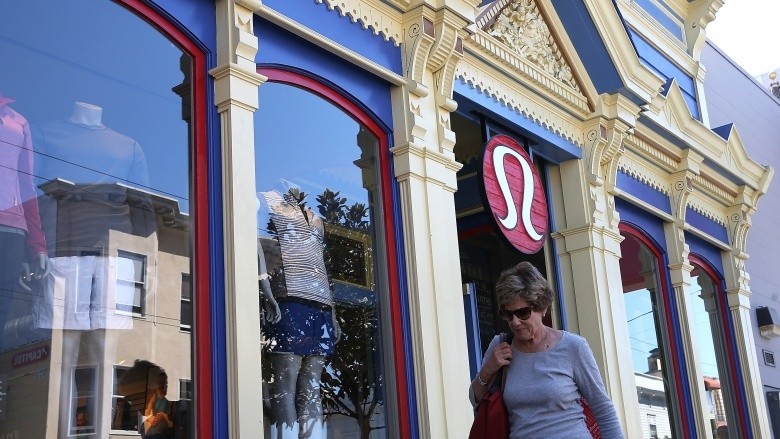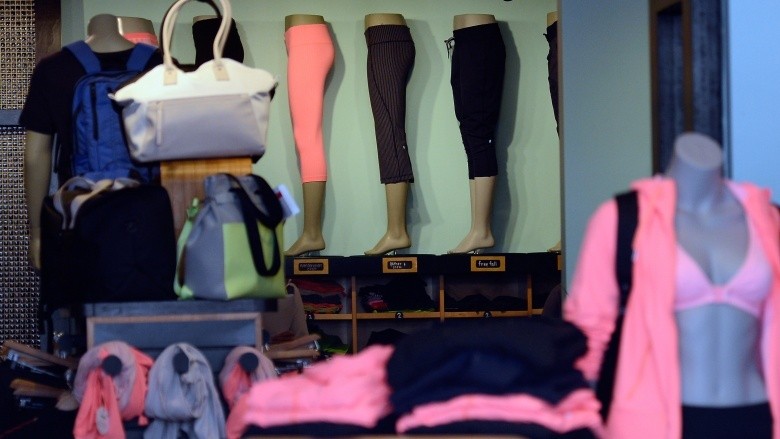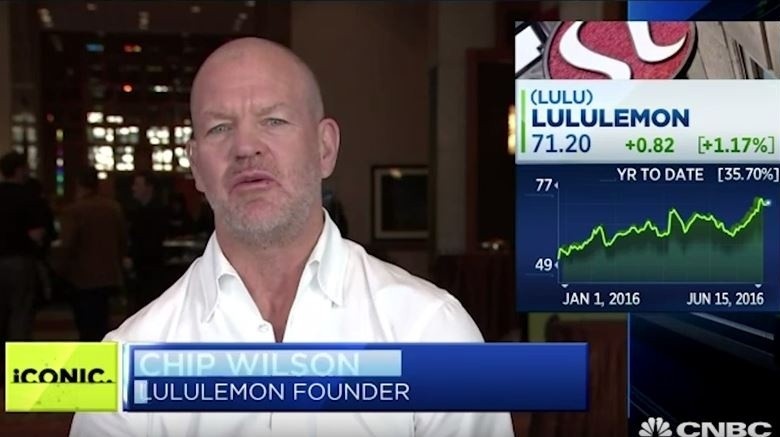Secrets Lululemon Doesn't Want You To Know
Founded in 1998 with a current Forbes Enterprise Value of $8.8 billion, Lululemon Athletica, known primarily as just Lululemon, is virtually a household name. Known for its high-end (and often pricey) athletic apparel, it is a brand adored by many. Still, Lululemon has had its fair share of sordid history. Because of that history, the brand can be quite polarizing. Here are some of the secrets Lululemon doesn't want you to know or wishes you would forget.
Secret messages
One of the things people love about Lululemon (beyond their clothing) are their reusable bags with the inspirational manifesto printed on the side. While the manifesto encourages people to remember that "friends are more important than money" and to "choose positive thought," the messaging on Lululemon bags hasn't always been quite so innocuous. When a Toronto mother washed her daughter's reusable bag in 2008, she was surprised to see the messages that were visible when the manifesto began to peel away. "There is little difference between addicts and fanatic athletes. Both are continually searching for a way to remain in a creative state" read one, while another asserted "You only have 30,000 days to live and then you are dead." While the mother told CTV Toronto that she thought it must be some kind of joke, Lululemon responded to CTV Toronto that it wasn't a joke. Instead, when they found out that some of their customers weren't keen on the messaging, they stitched over it rather than replacing the bags. After the newly ignited controversy, they reportedly destroyed the remaining bags.
Their bags may have been dangerous
Speaking of the Lululemon reusable bags, risque messaging isn't the only reason they've been controversial in the past few years. Durable and water-resistant due to being made with polypropylene, people use the bags for far more than shopping. While polypropylene is considered safe and often used in food packaging, some of the bags potentially weren't. The bags that debuted for the 2010 Vancouver Winter Olympics that had images of athletes on one side and the manifesto on the other were recalled due to reports of high levels of lead and concerns about the potential for lead poisoning. According to the Montreal Gazette, Lululemon staff were advised to return their bags days before the public was informed.
The Lululemon murder
In 2011, Lululemon employee Brittany Norwood murdered her co-worker Jayna Murray at the Lululemon store in Bethesda, Maryland. According to the investigators and trial records, Murray discovered Norwood was attempting to steal merchandise and confronted Norwood, who then used at least six weapons to bludgeon Murray to death. Not only did she kill Murray, Norwood tried to cover by staging it as a sexual assault gone awry, tying herself up and claiming to be a victim when she was found. Norwood was convicted of first degree murder and is currently serving a life sentence. Even though the two were Lululemon employees, you may be asking yourself what this has to do with the store. Some speculate that the highly competitive nature of Lululemon as a workplace may have contributed to the murder. A former employee told Cosmopolitan that the employee culture was cult-like. Whether the murder was directly related to Lululemon beyond location can't be known. Still, Lululemon probably wishes you would forget that it happened there.
They made false claims about their clothes
A Lululemon line called Vitasea was purported to be made from seaweed fiber that reduces stress and provides anti-inflammatory, antibacterial, hydrating and detoxifying benefits. In November 2007, The New York Times reported that Lululemon made false claims about its Vitasea line. The New York Times reached this conclusion after commissioning a lab to test a shirt from the line and compared the results to a similar test done by another lab. Both labs found that there was no significant difference between the Vitasea shirt and a regular cotton shirt. While Lululemon released a statement of their own that same November attesting that their own lab results confirmed that the seaweed levels matched what the tags and care instructions said, they were ordered by a Canadian agency to remove all health claims from the reportedly seaweed-based products in Canada.
Their clothes were recalled for being shoddily made
Health claims aside, there have been other issues with Lululemon clothing. After customers complained that women's black Luon pants were see through, Lululemon pulled them off the shelves, attributing the sheerness to a quality control problem where the pants were being made in Asia. The recall reportedly affected 17% of the women's pants sold in stores. Just a few months later, complaints started rolling in again. Customers complained that the pants were still too sheer and also reported excessive pilling and seams falling apart after just a few uses. Both the Chief Product Officer Sheree Waterson and CEO Christine Day left Lululemon within months of the recall and continued product complaints
The founder has been accused of fat shaming
On the heels of the complaints about sheer and shoddily made yoga pants, Lululemon founder Chip Wilson found himself in hot water after he told Bloomberg TV in November 2013, "Frankly some women's bodies just don't actually work for it" and "it's really about the rubbing through the thighs, how much pressure is there over a period of time, how much they use it." According to a report by Huffington Post that cited former employees, Lululemon shuns plus-size shoppers. The report suggested that it was company policy to discourage plus-size customers because "no customer wants to endure the embarrassment of asking a clerk to go find a bigger size." Time described the comments as fat shaming and many outraged women agreed.
The founder's controversy doesn't stop there
Beyond his comments about women's bodies, Lululemon founder Chip Wilson has said a lot of other controversial things. In a blog post published on the Lululemon site in 2009, Wilson claimed that smoking and birth control increased the divorce rate. He is quoted as saying, "Women's lives changed immediately [after the pill]. ... Men did not know how to relate to the new female. Thus came the era of divorces." Canada's The Tyee reported back in 2005 that Wilson favors using child labor in Third World countries because it provides them with much-needed wages.
The name Lululemon is entrenched in racism
According to Business Insider and Financial Post, Lululemon founder Chip Wilson told Canada's National Post Business magazine (which is now called Financial Post magazine), "It's funny to watch them try and say it," when asked about his views on the Japanese pronunciation of the company's name. While Wilson reportedly now denies saying this, a now-deleted blog post from 2009 on the Lululemon website stated the following about the name, according to Financial Post: "It was thought that a Japanese marketing firm would not try to create a North American sounding brand with the letter 'L' because the sound does not exist in Japanese phonetics. By including an 'L' in the name it was thought the Japanese consumer would find the name innately North American and authentic. In essence, the name 'lululemon' has no roots and means nothing other than it has 3 'L's' in it. Nothing more and nothing less." While the blog may now be deleted, the Internet never forgets. The permalink to the blog post still exists, though it now redirects to the Community events page, in hopes you'll forget all about it. If that weren't enough, he even more recently late-shamed a reporter by suggesting she's on Jewish Standard Time and therefore doesn't respect other people's time.
Ayn Rand is an inspiration
Founder Chip Wilson reportedly first read Ayn Rand's Atlas Shrugged when he was 18 and since then has had an affinity for the philosophies set forth in the book. The problem? The primary philosophy in the book, Objectivism, has been criticized for being based on selfishness. According to NPR, Ayn Rand said — while describing the answer to the book's often-repeated question "Who is John Galt?" — "His highest moral purpose is the achievement of his own happiness." Wilson's affinity for the book led to bags printed with "I Am John Galt" on the side. For many, this is contrary to what a yoga-based company should stand for and sparked outrage among some. While the original Lululemon blog post "Who is John Galt?" has also been deleted, a cached version of the page still exists. It notes that Wilson realized "the impact the book's ideology had on his quest to elevate the world from mediocrity to greatness (it is not coincidental that this is Lululemon's company vision)" and that the bags "are visual reminders for ourselves to live a life we love and conquer the epidemic of mediocrity. We all have a John Galt inside of us cheering us on."
They have been criticized for being phony
In addition to the outcry that Objectivism does not mesh with what yoga stands for, other yoga devotees have called questioned Lululemon's claim that they sell "yoga-inspired athletic apparel" while many of their products have nothing to do with yoga. Others reported in the same article have criticized the positive messaging of the Lululemon manifesto as being vague, unrelated to yoga, and as a slogan for selling rather than actual yoga ideology they claim the brand is built on. Former employees have been critical as well. In an anonymous Jezebel article, one former employee said, "Immediately after I started work at Lululemon, I realized that almost all their talk about empowerment and happiness was empty." Other former employees have shared similar stories, begging the question of what Lululemon really stands for.
Can Lululemon survive?
From risque and controversial messaging related to its manifesto to problems with the products themselves and criticism about the employee culture, Lululemon has many secrets they would like to keep buried or wish you would forget. Despite this the brand continues to try to reinvent itself, while entertaining the idea of taking over other brands in the same space. Still, Lululemon's stocks have been volatile. Only time will tell if Lululemon will survive its sordid past and the ever-increasing competition, or if as some suggest, the Lululemon reign could be over.
Lulu employees body-shamed a woman to tears
In January 2017, a woman named Heather Albert posted a heartbreaking story on Facebook detailing her traumatic body-shaming experience while shopping at Lululemon in Park City, UT. "I had weight loss surgery a year ago, and have lost 80lbs. I'm pretty proud of myself!" she wrote. Albert was in Park City for work and her fiancée insisted that she go to Lululemon to buy herself something.
She described how, "Shortly after I walked in, I heard one ED whisper (loudly) to the other, "DO we even have anything in her size??" and both proceeded to giggle. I was the only customer in the store. I knew it was directed at me. I was mortified," she wrote. "I was so embarrassed! I had a work function to go to that night, when I got back to my hotel I cried in the shower."
She explained that the comments weren't even true, which made them even more confusing and hurtful: "Now, I realize that not everyone fits into Lulu," Albert wrote, "but I'm a street size 10/12 and in Lulu I'm a 10/12 top and an 8/10 bottom. I'm not even close to maxing out on size there!"
Albert's post received supportive comments including, "I wear the same size and have always been treated this way in Lululemon. It's an unfortunate brand issue," and "I wouldn't spend another dime there if I were you! And Lulu should definitely make this situation right!" Luckily, it seems Lululemon did, in fact, make it right. In the comments section, you can see the brand responding with a sincere apology and asking Albert to reach out directly. Albert posted an update two days after her original post:
"I met with Carissa, who is the Regional Manager of lululemon for all of Las Vegas and Utah. She was very sweet, compassionate, and apologetic about my experience. She assured me that this is not representative of the brand culture, and that everyone involved in the Park City store was going to be involved in a meeting and trained on customer care and diversity. I feel very satisfied that this issue has been taken care of and I am happy with the outcome. Thank you Carissa for making my negative experience into a positive teaching opportunity."
Albert also spoke with Cosmopolitan.com, inspiring us all with her level-headedness and lack of spite: "The most important part of my decision to make my experience public was to ensure that the individuals involved are re-educated," she said. "I would never want anyone to lose their job over something like this — I'd much prefer diversity and inclusion training, so that it turns the negative experience into something positive, a learning experience."
Although Lulu obviously doesn't want to be associated with body-shaming and dealt with this swiftly, by the time they rectified the situation with Albert, it was already too late. Major sites reaching millions of people picked up the story, making us wonder how Lulu manages to keep digging themselves into such a deep PR hole.










